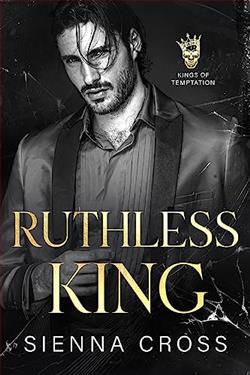Page 20 of Coram House
Stedsan shrugs. “If it wasn’t him, it would have been someone else.”
He’s ignoring the spirit of my question, but he had talked about Bill Campbell like they were friends the other day, so I decide to tread carefully for now.
We arrive at a long white trailer. A generator hums in the background. Stedsan knocks and a gravelly voice tells us to come in.
The small room is crowded with a filing cabinet and desk piled high with papers and an assortment of pens and coffee mugs. The airis damp and stale, like walking into a cloud of someone else’s breath. The man sitting behind the desk has white hair buzzed tight against his scalp and a deeply lined face. He looks far too old to be working construction, but the orange vest and wiry forearms suggest otherwise. The man doesn’t make any kind of greeting, just goes on reading his newspaper.
“Morning,” Stedsan says, his voice flat. That one word is enough to tell me he doesn’t like this man at all.
The other man lowers the paper, and widens his eyes in feigned surprise. “Why, it’s Mr. Alan Stedsan.”
He whistles and leans back in his chair. Then his eyes flick to me, running up and down my body in a way that makes me glad I’m still wearing my parka.
“Bill said you might be coming by,” the man rasps. A smoker’s voice. “This your writer?”
He says it like I’m a pet.
Stedsan turns. “Alex Kelley. This is Fred Rooney.”
The name goes off like an explosion. Sister Cecile. Tommy. Fred Rooney. I try to keep my expression neutral, but Rooney must see something because an unpleasant smile spreads across his face. “Look at that,” he says. “I’m famous too.”
Anger roils my stomach. How many more former children of Coram House am I going to run into before Stedsan decides to give me a heads-up? It’s too early in the morning to be bungling everything this badly.
“Well,” Stedsan says, “now that everyone’s acquainted, perhaps we could—”
“Not so fast.” Rooney wags a finger back and forth. Tick-tock. “Bill said to wait here—wants to take you in himself. Waste of time, if you ask me. But he’s the boss.”
Just then, the door opens. A man rushes into the office, icy air clinging to his clothes.
“Bill Campbell,” he says, pulling off his gloves. “You must be Alex. Sorry to keep you waiting. Alan—nice to see you again.”
Droplets of water cling to his hair, which is pure white and leonine.I’d guess he’s in his midsixties, but looks like the kind of person who still goes skiing every weekend.
We shake hands and exchange pleasantries. I thank him for taking the time to play tour guide. “Of course,” he says. “Happy to.” But his smile looks like someone trying to brave the jab of a needle.
“All right. I’ll be off, then,” Stedsan says.
I turn to him in surprise. “You’re not coming?”
“I have a meeting back at the office. Just wanted to make the introductions. No one knows this place better than Bill. You’re in good hands.”
Stedsan claps Bill on the shoulder. Despite my annoyance at Stedsan, I’m not sure I want him to leave.
“Well, shall we?” Bill says, ushering me toward the door. Then he turns back to Rooney, as if he just remembered something. “Fred, those lines still need checking along the east wall.”
“Sure do,” Rooney says without looking up.
Bill waits. The silence stretches. “Right,” Bill says, making a production of pulling on his gloves. He turns away, hand on the doorknob, when Rooney speaks again.
“Aren’t you forgetting something, boss?”
“What are you talking about?” Bill asks, flustered.
Rooney raps his knuckles on a hard hat sitting on the desk.
“Right,” Bill says. “Yes, of course.”
He grabs two yellow hard hats from a row of hooks by the door. He holds one out to me, expression apologetic. “We haven’t started on the old building yet, but technically it’s all a construction site.”















